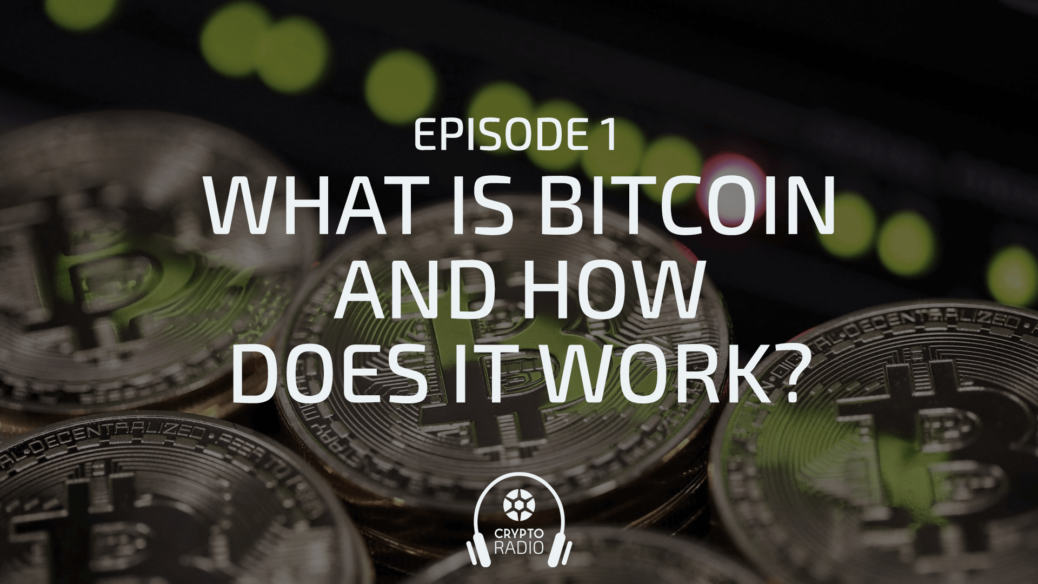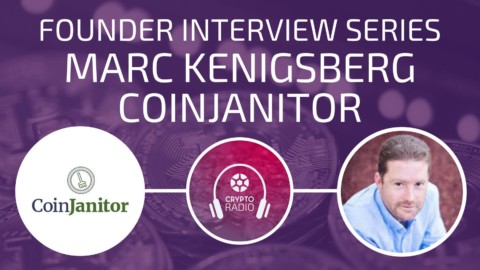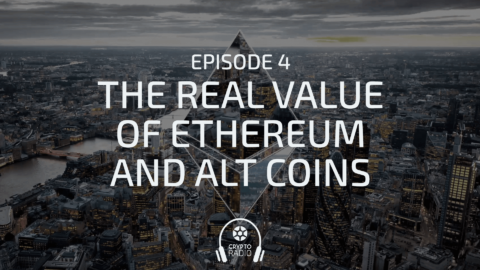Podcast: Play in new window | Download
Welcome to Crypto Radio. We interview top thinkers and entrepreneurs in the cryptocurrency and blockchain industry. We also cover topics like investing, trading, and ICOs. We’re your hosts, Mike Gilliland, Michael Paul, Chris Sparks and Euvie Ivanova. We’re entrepreneurs, crypto investors, and co-founders of a new blockchain investment platform cosyndicate.io. We created cosyndicate and Crypto Radio to make crypto investing a better experience for you.
In the first few episodes of this podcast we’re going to cover the basics of Bitcoin, blockchains, [00:00:30] and crypto investing. If you’re new to space these episodes are for you. If not, skip ahead to the episodes where we started to interview founders of blockchain projects and update you and all the news and important events in the crypto world.
Over the next few episodes we’re going to be running a contest to give you a chance to win over $3,000 worth of prizes, including Costa ticket tokens and a free membership to our private investment mastermind group. To learn how to participate go to cryptoradio.io.
Chris: So, welcome to the first episode of cryptoradio.io. [00:01:00] My name is Chris Sparks, I’m from the US. And we’re going to go over some very, very basic parts of Bitcoin for those of you who don’t know that much about it. Hopefully we can get those questions that you might not have been able to ask at the Thanksgiving dinner off your plate. So, let’s start with a very basic introduction to the concept. Michael, because we’ve yet to really speak together, what exactly is Bitcoin?
Michael: Yeah, it’s a really broad question I guess, but you know, I guess everyone’s familiar with it now in terms of like it being a digital currency? [00:01:30] So, it’s an open source, you know, code, so it’s very transparent. It’s not something that can be easily changed without people knowing about it. So, that’s where the kind of trust comes from.
And obviously there’s the sort of aspects of it which is very much like a currency, in terms of its ability to store wealth and value. So, you know, there’s a finite amount of it. There’s a certain amount produced and it’s kind of knowing how much is produced, like an inflation rate. So, anyone can pretty much look at the code, buy and sell it like an asset, and it’s decentralised so it doesn’t belong to anyone now.
And that means it’s very hard for governments to control. So, that’s kind of at a high level where it’s come from. [00:02:00] There have been digital currencies before that weren’t really the same type of code, in terms of they weren’t Blockchain technologies. So, they’d been easier to shut down by previous governments. But this is something that’s just kept growing and growing and there’s no sort of servers you can shut down or office you can shut down, so it’s a very different kind of entity.
Chris: It almost doesn’t really matter actually who, quote unquote, invented it right? Due to the open source nature of it, it’s a feature of being open source is that it’s actually created by the proverbial crowd, right? So, it doesn’t even matter who the original owner is, it’s just that it’s being continuously created by [00:02:30] everybody who uses it on the network.
Mike: In the case with Ethereum, Vitalik Buterin is kind of the central figure even though he can’t individually manipulate the Ethereum code, he’s sort of looked at as the leader and if he says something about the direction that Ethereum should go then he can really influence the technology and the markets. In the case with Bitcoin, that doesn’t really exist because no one knows who to look for as the leader of Bitcoin. So, it’s truly more decentralised even socially speaking.
Chris: Yeah, and or who to prosecute if you’re looking to [00:03:00] put blame on one person in particular. So, Bitcoin is another one of those things, it’s a technology that’s so different to everything that we’ve had in the past. You could ask 15 different people on the street, “What is Bitcoin?” and you’d get 15 different answers. Can anybody think of a definition of ‘Bitcoin’ from, let’s say, the position of a lawyer?
Michael: Definition I’ve heard most people agree on is it’s a digital transfer of value.
Michael: Yeah, I’ve heard it called Digital Gold, and I think that’s the most common analogy people understand it as, that the Common Man. And obviously, there’s a lot of technical definitions [00:03:30] but fundamentally that’s what it’s designed to do is a store of value and a transfer of value. I mean, there’s certain characteristics that make Bitcoin much more efficient than gold, because obviously you can move it around much faster, it’s much easier to do without carrying much gold round in your bag.
Chris: Right, and breaking down into much smaller amounts than you will be able to with gold. One of the things that my sister asked me the other day, she’s trying to get into Bitcoin or at least understanding it at a very bare minimum is, “What is so special about this date of 2008? There’s tons of other innovations that existed [00:04:00] before Bitcoin to service a similar purpose. What is it that makes Bitcoin so much different than every other innovation that came before?”
Michael: I think it’s just a lot more resilient. So, it’s much harder to shut down and basically if anything’s competing, you know, with other systems of value, there’s always going to be competition and it’s not always fair competition. So, you look at other systems of digital cash and each that been shut down in the past because they were almost a threat.
And, you know, little towns and cities and villages always create their own currencies for a while and then they get shut down. So, there’s this always happening throughout history. And Bitcoin’s just something that’s a lot more resilient, [00:04:30] they haven’t been able to shut it down. So, it’s still around and obviously the longer it’s around, the more trust there is that it’s going to stay around because it hasn’t been able to be hacked or have been taken down or co-opted. So, that’s where the confidence kind of comes and builds over time. It’s been, you know, nine years now.
Mike: Bitcoin is really one of the first times we’ve ever been able to have a peer-to-peer internet currency that enables instant payments to anyone in the world. Before that we needed banks to facilitate those transactions and keep a ledger. Now, the ledger is distributed and copied amongst multiple nodes within the network, [00:05:00] so it’s always being synchronized and keeping transactions up to date and making sure that we don’t need a third party to enable those transactions and validate those transactions.
Euvie: Yeah, that’s right. I think Bitcoin is the first digital currency that solved the double spend problem. So, you can’t spend the same amount of Bitcoin twice, because that copy of the ledger is stored on every node in the network. So, the fraud in Bitcoin is almost impossible.
Chris: So, we hear this term ‘mining’ getting thrown around a lot, and we know that it’s analogous to mining gold [00:05:30] in the real world, in the physical world. But how can we explain to the newbie the creation of Bitcoin? How is Bitcoin created?
Mike: So, since Bitcoin doesn’t have a central government, miners use special software to solve math problems and they’re rewarded with a certain amount of Bitcoin. This provides a really predictable way to issue new currency and also gives an incentive for more miners to participate. And when more miners participate, the network actually becomes more secure.
Michael: Bitcoin is self-adjusting in terms of the difficulties. [00:06:00] So, there will always be a certain amount of coins minted, no matter how much mining power is thrown at it. That’s what makes it consistent and predictable. And obviously, there’s more value in Bitcoin now. So, there’s more miners competing to solve those problems and they’re all trying to get it, you know, and get some Bitcoin out of it.
If half the miners were to disappear overnight, like there was a big earthquake or disaster? Bitcoin would just carry right on in terms of, you know, the amount of coins coming out of the box, Shane. Maybe just be less mining power, so it’s be less intensive.
Mike: So, there’s actually a finite supply of Bitcoin. At some point, when miners mine 21 million Bitcoin, the [00:06:30] supply of new Bitcoins is going to stop. And what’s going to happen is the transaction validation that needs to occur and is getting rewarded currently with new Bitcoins is actually going to get rewarded just through transaction fees alone.
Michael: Yeah, it’s finite and it’s kind of decreasing. So, there’s a very deflationary emission curve. If you look at like Fiat currency, they tend to be very inflationary, there’s more and more produced over time. Whereas with Bitcoin, they have sort of halving events where essentially, you know, every four years you have less and less Bitcoin produced by the algorithms.
So, over time it kind of comes to almost zero [00:07:00] and I think, you know, in a few years there won’t be very many minted at all. So, it will kind of keep going at a very, very small rate, just enough to kind of support the miners to keep running the system. That’s kind of how it’s designed.
Chris: They’re saying that the prediction that is around 2140 will be the last Bitcoin minted.
Which gives us plenty of time to replace all other monetary systems worldwide that are currently controlled by governments. And so, let’s just pretend for a second that I am the US government and I’m looking for the person who created this Bitcoin thing.
Because it’s slowly stealing market share [00:07:30] from my pie. I want my pie back. Who do I blame for this? Who ate my damn pie?
Euvie: That’s actually something that makes Bitcoin really unique is that nobody owns it. Although it was created by somebody who is known by Satoshi Nakamoto, that was most likely a pseudonym and we don’t know if it was one person or a group of people. It was based on the conversations with this person, because they use different styles of language in different conversations. People think that it was actually several different people [00:08:00] behind the pseudonym.
Mike: You can trace the ledger all the way back to the original minting of Bitcoin. And there’s even evidence to say that Satoshi set this up in such a way that, well, he could have taken advantage of it but he didn’t. So, there weren’t a whole lot of coins reserved for him. Basically, he wanted to spread out the network.
Michael: Yeah, and like, different with Bitcoin, Blockchains you see today there’s like an instant minor pre-mine, where it’s very centralised control. That wasn’t the case with Bitcoin. He actually just kept mining it himself, until there was enough interest for other people to take over and start mining. [00:08:30] So, it’s definitely kind of differently, you know, designed from the outset.
Euvie: And then, at some point, he stopped being involved in it completely in 2010, and he just disappeared from the face of the earth and has never been seen or heard from.
Mike: Yup, gave away all the domains for Bitcoin to prominent people in the community and then just disappeared. Mysterious character.
Chris: Yeah, so just like in, I guess it was whenever email became mainstream, we had to start getting used to communicating with each other by non-physical means [00:09:00], I think it’s also something that we’re going to have to start getting used to is people actually developing value communications channels like Bitcoin, like Ethereum, like IOTA and not really being able to centralise the development on any particular person or group.
Because it is open source, we have to start getting used to not thinking of like people being personas of these technologies. In the case of Vitalik Buterin, it’s kind of the cat’s out of the bag, this is the guy. In the case of Bitcoin, it’s not centralised on any particular person [00:09:30] or identifiable group of people.
Euvie: Although, there are developers who are working on the Bitcoin code, who are continuing to improve it and who influence it in that sense, and they’re also prominent in the community who speak about it a lot who might influence people’s opinion about it. But, again, it’s many different people, it’s not one single person. So, you know, if anyone says, “Who’s the CEO of Bitcoin?” and people in the cryptocurrency space just laugh because there’s no such thing.
Mike: Yeah, when people first get into Bitcoin they don’t realise that [00:01][0:00] they’re their own bank. So, if you lose your Bitcoins there’s actually no customer service line to call.
Chris: Yeah, who’s in control of all this stuff then? Who do I call if there’s a problem? I mean, if I sell my house, mortgage it again, like a couple people are doing actually here in Holland, what kind of recourse do I have if there’s a problem with the system? Who’s in control of this?
Euvie: So, ultimately no one but there are different entities that interact with the Bitcoin blockchain and make it more useful, for example, exchanges or wallets or hardware wallets [00:01][0:30] or different businesses that accept Bitcoin. So, if you are interacting with one of those entities then they have some control over helping you if something goes wrong, but not always because ultimately it is a decentralised network.
So, Bitcoin is really heavy on the idea of sovereignty. So, you own your own keys, you own your own Bitcoins, and you have full control over it. But if you do something wrong then you take responsibility for it.
Chris: So, when we talk about [00:01][1:00] exchange of value and being your own bank, how exactly do the Bitcoin transactions work on this Bitcoin network?
Michael: So, trying to keep this very high-level because I don’t want to get too, too nerdy but essentially the miners, that are also, you know, securing the network, they are processing the transactions. So, every time you send something, it has to go to a mining node, and then that mining node will basically process that transaction and pass a copy of that to all the other nodes.
So, it’s pretty much just like, you know, servers in a cloud. You can look at that way as an analogy and they’re all, you know, communicating information about what transactions they processed [00:11:30] and passing that on. So, that’s what’s doing the work and they get rewarded for that, we know, with getting Bitcoin.
Chris: Okay. What’s a node actually?
Michael: A node is just like a miner, someone who’s involved with a network to process and secure, you know, the network.
Mike: And the node has a copy of every single transaction that’s ever occurred on the network.
Chris: Can’t a node also be just an individual on the network itself?
Michael: Not typically because a node always has to be active to be able to get block rewards. So, you can have a wallet held in Bitcoin, you know, in cold storage it never touches the internet, it never communicates with anything and if you want to [00:12:00] then send it you have to connect it to the network, but you’re not a node at that point. You’re just like a user of the network.
Chris: Are there nodes that are not miners?
Michael: Not on Bitcoin.
Chris: Okay.
Michael: There’s plenty of other sort of cryptocurrencies that run on top of Bitcoin, so Bitcoin’s become like a layer for growth. But that’s, you know, a sort of separate part of the ecosystem.
Chris: Right.
Euvie: So, it’s probably worth mentioning something that we didn’t mention in the mining discussion is what kind of the purpose of mining is. One of the things that mining does is it verifies new bitcoin transaction. [00:12:30] So, when a miner is solving complex mathematical problems, and once they have solved enough then they add a new block to the blockchain. And this block is a block of transactions. So, when people send a transaction it’s first and confirmed and then when a block gets mined, that transaction gets assigned to a block and then that block becomes public on the blockchain.
So, yeah that’s all transactions get verified and sent.
Chris: [00:13:00] So, it is like a giant Excel sheet, right? You can think of it like as a network everybody on the network basically communicates their transactions between each other to a giant Excel sheet. And you send that Excel sheet to the miners, who are going to confirm the validity of each transaction and as they confirm the validity they’re racing to actually be the first to confirm that all the transactions are in fact valid.
And whoever actually wins that, whichever miner or group of miners, is the first to make sure that [00:13:30] all the transactions are valid they get rewarded then with a certain amount of Bitcoin.
Euvie: At this point I know that some people are going to have the question, “Well, if it’s the miners confirming the transactions, then isn’t there an incentive to cheat?” So, what if they send their own transactions that are fraudulent and then confirm their on transactions?
Michael: Sure, and that’s why every other node has a copy and there has to be consensus and, you know, a certain amount of confirmations before it’s accepted as the valid copy. And that’s why get forks, because if someone doesn’t agree on that process [00:14:00], you know, you can split off that blockchain, there can be two independent copies of that blockchain running if there’s a disagreement on the consensus. So, that’s how hard forks come into it.
Mike: Hard forks are another way to actually update the software that’s running Bitcoin. So, if there’s a proposed change for security reasons, or the software just needs to be updated then the community will converse about this, code will be proposed, and then the miners have to agree that yes, we’re going to switch over and start using this new version of the software. And then at that point a fork occurs, where you have [00:14:30] a copy of the original database and then everyone can agree to use that or not.
So, that’s why there’s generally two different versions after a fork because you can actually delete the original. So, you have to, the whole network has to decide which one they’re going to use.
Chris: So, that’s sort of one of the democratic functions of blockchain, as well, right? Basically, anybody can put a blockchain or version of Bitcoin out there into the world. If they feel like it’s necessary and they can convince enough people to join them in putting that into the world, right? [00:15:00] So, that’s another really positive thing about this technology is that anybody can basically do it. Okay, so again, coming back to the governmental aspect of these things. How legal is Bitcoin? What sort of confluence of law and Bitcoin can we expect in the future, and what’s happening right now?
Mike: This is really fun territory to talk about actually, because it’s definitely a situation where governments are seeing their pie being taken from them. But because of the nature of the technology, it’s extremely difficult to regulate or stop it or shut it down or censor or anything like that.
[00:15:30] There’s nothing that can actually be done physically to the Bitcoin network, unless you’re going to attempt to shut down every single computer on the internet. They’re having to be inventive in how they actually deal with these situations, deal with the technology. And one of the things they’re trying to do is shut down exchanges or get the information from exchanges of like who’s using cryptocurrency exchanges. So, this is something that’s kind of currently developing and unfolding as we speak.
Michael: And they can’t come out and ban Bitcoin, because essentially it will show how powerless they are to stop it. So, they have to be very careful [00:16:00] in terms of like confidence and how they’re perceived to be controlling the situation, that’s always what it comes down is confidence and public perception. And if they come out and say, “We’re banning Bitcoin,” and it carries right on, everyone realizes they’re totally powerless, you know, they lose all control even faster. So, they’re just trying to co-opt the system in different ways and monitor it and regulate it, and eventually tax it when it becomes an asset that, you know, has enough value to be worth going after.
Euvie: So, currently, as it stands right now, I think that most governments in the world have not outright banned Bitcoin, except for Russia. [00:16:30] They have been very, very negative towards Bitcoin. They’re generally negative towards any foreign currency, and Bitcoin kind of falls under that. But many countries have banned different aspects of Bitcoin use, for example, all the Bulgarian banks recently just got together and froze the account of any business that deals with Bitcoin.
Or, in China a few months ago they banned ICOs which is a crowdfunding form of using cryptocurrency. But they can’t outright ban Bitcoin, it’s not possible.
Chris: [00:17:00] They may be banning Bitcoin and they might be banning ICOs, but they’re not banning blockchain technology itself. In fact, a lot of governments are very excited about blockchain technology. You shouldn’t be scared off if you hear that Russia and the US and China are banning, you know, specific cryptocurrencies, or specific applications of blockchain technology.
There’s also a lot of things that these governments are actually employing from the technology itself. One of the main arguments against blockchain is that it’s used for illegal stuff. People use it to buy drugs, [00:17:30] that was sort of the first popular application of it was back in, what, 2011 when people were buying marijuana off of the Silk Road in the US. Is it used for illegal activity?
Mike: The short answer is yes, but so are cars used to transport bank robbers. A butter knife can be used as a murder weapon. Oxygen is used to fuel criminal’s bodies. So, it’s like banning it outright for that reason is kind of silly, because it’s nothing more than a transfer of value. Yes, it can be, originally it was propped up by transactions for illegal things: guns, drugs, [00:18:00] any number of things on the Dark Web.
And that kind of gave its legitimacy as a store and transfer of value originally, and now it’s been more commonly adopted by businesses and individuals who want to store wealth, transfer wealth across borders without having to worry about government interference, any of that kind of stuff. So, the legitimacy of it has been proven before and after its use as a way to purchase illegal things.
Euvie: And because Bitcoin is transparent, because every transaction is recorded on the public blockchain, [00:18:30] you can actually see every transaction happening, like that information is available to everyone. And although the transaction only carriers its number, you know, the number of the transaction and the number of the wallet that it was sent from and to, so it’s not anonymous in the sense that like you can’t necessarily tell which person sent it. But a lot of the time you can guess based on other information.
So, actually overall fewer and fewer criminals are using Bitcoins because it’s so transparent. [00:19:00] The percentage of that that is used for criminal activity is actually less than for cash, because cash is harder to trace.
Michael: Yeah, exactly. And actually, the main currency now used for sort of anonymous or private transactions on the dark markets, where a lot of illegal stuff happens, is called Monero. And that’s because it’s a lot more private. So, that’s actually the main currency used for that purpose. Bitcoin’s main function or use, in this case, is very different now. So, it’s used a lot more widely and publicly by, yeah, tons of industry and different businesses and things like that.
Mike: Thanks for listening to Crypto Radio. [00:19:30] To get the show notes, links, and other resources from this episode go to cryptoradio.io/1. In the next episode we’ll talk about whether Bitcoin is a bubble and if it should be regulated.
Welcome to the first episode of Crypto Radio.
In the first several episodes, we will introduce you to the basics of Bitcoin, blockchain, and cryptocurrency investing.
In future episodes, we will interview the top thinkers and entrepreneurs in the industry, and cover other topics like blockchain news, technology developments, investing strategies, trading, and ICOs.
What is Bitcoin?
If you’re new to Bitcoin, this episode is for you.
We answer many of the common questions that people have about Bitcoin:
- Who created Bitcoin?
- Where do Bitcoins come from? What is mining?
- How do Bitcoin transactions work? Are they anonymous?
- Is Bitcoin controlled by anyone?
- What makes Bitcoin different than other forms of digital currency?
- What is the legal status of Bitcoin?
In Episode 2, we will continue talking about the basics of Bitcoin, and get into whether bubble is a bubble and if it should be regulated.









